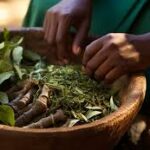Traditional medicine: Africa’s Hidden Healthcare Power

Traditional medicine has been a cornerstone of African healthcare for centuries. Long before modern hospitals and pharmaceuticals, communities relied on herbs, roots, spiritual practices, and traditional healers to treat illnesses. Today, traditional medicine continues to play a vital role in Africa’s healthcare system, with the World Health Organization (WHO) estimating that up to 80% of Africans still rely on traditional remedies for primary healthcare needs. But what makes traditional medicine so enduring, and how can it complement modern healthcare in Africa?
Why Traditional Medicine Remains Popular in Africa
1. Accessibility
In many rural areas, modern healthcare facilities are scarce or too far away. Traditional healers and herbal remedies are readily available within communities, making them the first point of care for millions.
2. Affordability
Modern drugs and hospital treatments can be expensive. Traditional medicine often provides a more affordable alternative, especially for low-income families.
3. Cultural Beliefs and Trust
Traditional medicine is deeply rooted in African culture and spirituality. Many patients trust healers not only for physical treatment but also for emotional and spiritual guidance.
4. Holistic Approach
Unlike modern medicine, which often targets specific symptoms, traditional medicine tends to take a holistic approach, addressing the mind, body, and spirit of the patient.
Challenges of Traditional Medicine in Africa
1. Lack of Standardization
Dosages and preparation methods vary widely among healers, leading to inconsistent results and, in some cases, harmful side effects.
2. Safety Concerns
Some herbs may be toxic or interact dangerously with modern medicines. Without scientific validation, patients risk serious health complications.
3. Limited Research and Documentation
Much of traditional knowledge is passed down orally. Lack of formal research and documentation makes it difficult to integrate traditional medicine into mainstream healthcare.
4. Regulation Issues
Many African countries lack clear policies to regulate traditional medicine, which creates opportunities for exploitation and misuse.
The Impact of Traditional Medicine on Healthcare in Africa
Traditional medicine significantly eases the burden on overstretched health systems. During outbreaks such as Ebola and COVID-19, many communities turned first to traditional remedies before seeking hospital care. While not always effective for such complex diseases, traditional healers often provide vital first aid, emotional support, and basic treatment in areas where hospitals are unavailable.
Traditional medicine also plays an important role in maternal care, malaria treatment, and mental health support across many African cultures. By addressing both physical and spiritual needs, it often achieves patient satisfaction where modern healthcare alone may fall short.
Bridging Traditional Medicine & Modern Medicine
1. Research and Validation
Universities and research institutes across Africa are now studying medicinal plants to validate their safety and effectiveness. For instance, artemisinin, a compound derived from a traditional Chinese herb, revolutionized malaria treatment — proof that traditional remedies can lead to global medical breakthroughs.
2. Policy Development
Governments must develop clear policies to regulate and integrate this medicine into national health systems. Nigeria, Ghana, and South Africa have already taken steps toward formalizing the role of traditional healers.
3. Training and Collaboration
Healthcare professionals and traditional healers should collaborate. Training programs can help healers identify when patients need modern medical attention, while doctors can learn to respect cultural practices.
4. Public Awareness
Patients need education on the safe use of traditional remedies and the risks of self-medicating without guidance from trained professionals.
Conclusion
This type of medicine remains a powerful force in Africa’s healthcare system, providing care for millions where modern medicine has yet to fully reach. While it comes with challenges of regulation, safety, and standardization, it also offers unique opportunities to expand healthcare access and preserve cultural heritage. By combining the wisdom of traditional practices with the rigor of modern science, Africa can build a more inclusive, effective, and sustainable healthcare system for future generations.
Written by Fawzi Rufai, Medically Reviewed by Sesan Kareem



